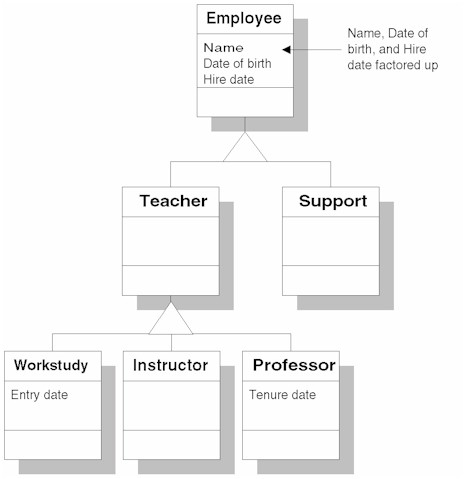Creating Class Hierarchy by Factoring Attributes
The Teacher View and the Employee View can be used as hints for creating intermediate classes above the leaf classes. Inspection of these views will provide ways for factoring attributes up higher in the class hierarchy. The term factoring attributes up refers to moving the definition of the attributes up as high as possible in the class hierarchy. Looking at the multi-type views will likely show you which attributes can be factored up and what name you should assign to the new intermediate classes above the leaf nodes. The name is usually the same name as the multi-type view that you are using.
To create the intermediate classes above the leaf classes, simply add the Teacher and Support Classes above the tentative classes and factor up the common attribute based on the multi-type view. The result is shown below.

Adding the Student Class to the hierarchy. Also see the related content below.
Context for Creating Class Hierarchy by Factoring Attributes
Related Articles for Creating Class Hierarchy by Factoring Attributes
Author
Douglas K Barry
Principal
You may use this material for your work or classes. Reprint Policy. Be sure to check the menu at the left for other articles available on this site.
The Savvy Manager's Guide
Douglas K Barry is also the author of a book that explains Web Services, service-oriented architecture, and Cloud Computing in an easy-to-understand, non-technical manner.
Web Services, Service-Oriented Architectures, and Cloud Computing: The Savvy Manager's Guide (Second Edition)
by Douglas K Barry with David Dick
This is a guide for the savvy manager who wants to capitalize on the wave of change that is occurring with Web Services, service-oriented architecture, and—more recently—Cloud Computing. The changes wrought by these technologies will require both a basic grasp of the technologies and an effective way to deal with how these changes will affect the people who build and use the systems in our organizations. This book covers both issues. Managers at all levels of all organizations must be aware of both the changes that we are now seeing and ways to deal with issues created by those changes.

